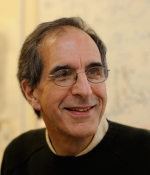 Cyrus Chothia (KN05)
Cyrus Chothia (KN05)
MRC Laboratory of Molecular Biology, Cambridge
United Kingdom
Presentation Title: How lucky I have been
Date/Time: Tuesday, July 14th, 9:00 am - 10:00 am
Introduction by: Alex Bateman
This special award presentation for Cyrus Chothia will feature short presentations from Arthur Lesk, Steven Brenner and Julian Gough followed by a short Q&A with Cyrus Chothia
Award Presentation by: Alfonso Valencia
Abstract:
TBA
Biography:
Cyrus Chothia came to the Laboratory of Molecular Biology (LMB) in 1970, after Ph.D. research under Peter Pauling at University College London (UCL). Three years later he started his grand tour with Fred Richards at Yale, Michael Levitt at the Weizmann Intitute and Joel Janin at the Institut Pasteur. Cyrus and Michael developed the "all-a, all-b, a/b and a+b" classification of protein structures, and with Joel, he determined principles that underlie protein-protein recognition and packing of protein secondary structures.
Cyrus returned to Cambridge in 1976, attached to the LMB and UCL, and was the E.P.A. Cephalosporin Fund Senior Research Fellow of the Royal Society until 1990. He and Arthur Lesk showed that proteins adapt to mutations by changes in structure; described how distant protein sites transmit information; and showed that the sequence of immunoglobulin hypervariable regions can predict their conformation. Cyrus collaborated with Alexey Murzin, Steven Brenner and Tim Hubbard to create the SCOP database in 1995, and with Julian Gough he created the SUPERFAMILY database in 2002.
























